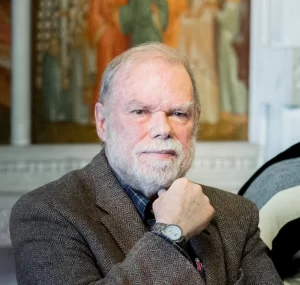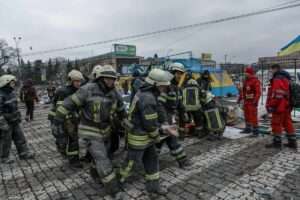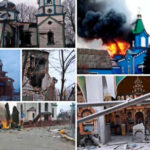Peace and Peacemaking as an Interfaith and Ecumenical Vocation: An Orthodox View
Peace and Peacemaking as an Interfaith and Ecumenical Vocation: An Orthodox View
Mar 9, 2011
Rev. Dr. Emmanuel Clapsis
Abstract[1]
For Orthodoxy, peace is inextricably related to the notion of justice and freedom that God has granted to all human beings through Christ and the work of the Holy Spirit as a gift and vocation. The peaceable witness of the Church in situations of war cannot be limited only to its ethical judgment. She won’t prevent wars. Peace requires much more than a military action or passive pacifism. The Christian gospel invites the faithful to a continuous spiritual struggle and public actions that leads, by the grace of the Holy Spirit, towards greater justice and peace.
General Remarks
In an increasingly complex and violent world, Christian churches have come to recognize, along with other communities of living faiths, that working for peace constitutes a primary expression of their responsibility for the life of the world. This responsibility is grounded on the essential goodness of all human beings and of all that God has created, continues to sustain, and is leading towards unity and a greater future. For Orthodoxy, peace is inextricably related to the notion of justice and freedom that God has granted to all human beings through Christ and the work of the Holy Spirit as a gift and vocation.[2] Peace and peacemaking as a gift and vocation provide opportunities to connect theology with ethical witness, faith with social transformation. The dynamic nature of peace as gift and vocation does not allow its identification with stagnation, passivity and the acceptance of injustice.
While the Orthodox churches affirm that peace is an integral and indispensable element of the Christian gospel, they have not sufficiently reflected - in a morally consistent manner - on the nature of peace and peacemaking and how peace affects in practical terms, their life and witness to the world.[3] Orthodox theologians have noted that offering simply a theoretical presentation of the Orthodox understanding of peace is not a sufficient expression and witness:
It is not enough for us (Orthodox) simply to theologize, to describe and to prescribe regarding the Orthodox vision of justice and peace. We must also mobilize and work together for God’s purpose to defeat injustices and to establish justice wherever possible, as well as to overcome the forces, which threaten peace on earth.[4]
The contextualization of peace and peacemaking and the critical appreciation of the ecclesial actions or inactions for the advancement of peace compel the Orthodox Church to explore different but complementary ways to relate their liturgical and spiritual experience and faith with the complex and conflictual issues of the world. Such a move evokes accusations that the Church moves from the spiritual realm to politics, an “activism” that is alien to Orthodoxy. Commenting on the reluctance of the Orthodox churches to address issues of public life, Metropolitan John Zizioulas believes that they are right to give preeminence to those elements of their tradition that refer to the centrality of eschatology but they are wrong to disconnect eschatology from history, theology from ethics, and generally to be indifferent in finding and witnessing God in the historical realm.[5]
Orthodox theologians because of close association of many Orthodox Churches with the State and their long oppression by totalitarian regimes have not adequately and critically reflected on the reflexive relationship of “self and society,” and the Christian imperative of the simultaneous transformation by God’s grace as well as of Christian discipleship of both. Oppressive, unjust, and violent social structures jeopardized the humanity of the oppressed and a just society is at risk of being corrupted by unjust and greedy self-centered individuals. Fr. Stanley S. Harakas regretfully notes the undeveloped status of social ethics in Eastern Orthodoxy most especially on peace studies:
There are few Orthodox writers and thinkers who have dealt deeply and thoughtfully with these issues. Still fewer, if any, have provided theoretical underpinning for a consisted and authentic Orthodox Christian Social Ethic. Because of this there is the danger that our social concern will become subject to mere sloganeering and worse yet, become the tool of alien forces. For example, Peace as an ideal for the Christian Church is almost self-evident. Yet there is no such thing as a coherent body of Orthodox peace studies. Few, if any, Orthodox theologians have concerned themselves with the problems of pacificism, disarmament, nuclear war, just war theory, peace movements, etc. There is a danger on this issue that we will allow ourselves simply to be used as a propaganda outlet.[6]
This lamentable situation in the words of another Orthodox Scholar, Grant White, “must not become an excuse for inaction in the face of suffering of incomprehensible proportions.”[7]
The World Council of Churches since the early 90s has provided opportunities for Orthodox theologians to reflect on the issues of justice and peace.[8] The military invasion of Iraq by the United States has generated among Orthodox theologians in the USA an interesting debate on whether Just War, judged by the standards of the Orthodox Church, is a “lesser good” or a “lesser evil.”[9] Violence is neither fully legitimized from the perspective of the Church when it is viewed as a “lesser good” nor is unconditionally renounced when it is considered as a “lesser evil.” Most Orthodox theologians have defended the peaceable nature of the Orthodox Church and at the same time have conceded that the use of force is sometimes an inevitable tool of good statecraft provided that it is guided by a set of strict and yet meaningful moral restrains in its practical application.[10] The theological assessment of violence however seems to remain an issue of contestation.
Does the eschatological nature of the Christian faith allow us to give a conditional theological legitimacy to violence? The eschatological orientation of the gospel while it teaches us that a fully reachable earthly shalom is unattainable in history, it places the world in a dynamic process of transformation by the grace of the Holy Spirit that moves the world closer to the peaceable reign of God. Eschatology is a subversive principle that questions every necessity that legitimates violence. As Gregory Baum states:
Replying to the question ‘can society exist without violence?’ in the negative gives permission for societies to reconcile themselves with the violence they practice. Replying Yes to the question, in the name of divine promises, challenges every society to review its practices and reduce its reliance on violence.[11]
Peace, of course, is more than the absence of war. It does not deny conflict, an intrinsic element of human relationships, but neither does it identify conflict with violence. Violence is not the only way to resolve conflicts. Peacemakers are constantly groping to find ways in which people and communities can resolve their differences without physical violence. Peace is a dynamic process not an absolute end point. Genuine peace means progress toward a freer and more just world.
Metropolitan George of Mount Lebanon, living in a Muslim country and having personally experienced the cruelties of religion-sanctioned wars and strife, addressing this issue of religious sanctioned violence has argued that that the Church cannot exercise its vocation of peace and peacemaking in a plausible manner if it cannot exorcise war. He notes:
In the church a vision of inwardness where peace becomes our vocation is plausible only if war can be exorcised. How can it have come about that pure and pious men like the inquisitors had such a bad theology? This constitutes one of the tragedies of our past. Nothing can be accomplished until the biblical foundations of violence are shattered. For us the error lies not in history but in theology. Violence is justified, fed by the belief that God of the Bible led Israel from victory to victory and that he willed all nations to submit to it…
Alongside this bloodthirsty God, there arises the image of a merciful God whose voice speaks in prophets like Jeremiah and Hosea and in the Song of the Servant in Isaiah. We are confronted here with two irreconcilably opposed faces of the Lord in the same Scripture.[12]
He argues that for Christians these incompatibles image of God must be read and interpreted through a “kenotic” reading of the Scripture and suggests that the “The Cross alone is the locus of divine victory, and the source of the meaning of faith. Anything in the Scripture that does not conform to the mystery of Love is a veil over the Word. Love is the true locus of the Word, because it alone is a divine epiphany.”[13] Other Orthodox scholars risking the accusation of being Marcionites tend to bypass the violent texts of the Scripture especially of the Old Testament as early stages of understanding God’s revelation that the New Testament has surpassed. In the Patristic tradition the violent texts of the Scripture have been interpreted through the “allegorical method” to describe “Spiritual personal struggles against evil and sin.”[14]
The renunciation of the violence, war, and terrorism as destructive of human lives, unjust and oppressive becomes a credible expression of the Church’s faith only when it is complemented with ethical practices that point to their prevention. The peaceable witness of the Church in situations of conflict and war cannot be limited only to its ethical judgment about the legitimacy and rules of conduct of war or even its unconditional renunciation. Peace requires much more than a military action or passive pacifism. If our ethics focus only on when a military action is right or wrong it limits our concern to a military action and does not encompass preventive actions. A remedy to this limitation is for the churches to develop just peacemaking practices that move their ethical discourse from theories that justify or regulate the use of violence to preventive actions that contribute to the building up of a culture of peace.[15]
The peaceable witness of the churches won’t always prevent wars and Christians may continue to disagree on when, if ever, war and military force are justified. But it is possible for them to work together and even reach consensus on the question: “what practices of violence prevention and peacemaking should they support?” Even if they believe in the justification of some wars, they still need an ethic that enables them to think clearly about initiatives of peacemaking. Pacifists, also, have the moral obligation in situations of aggression, injustice and violent conflicts not simply to renounce violence and war but to invent peaceful means and actions by which justice, peace and reconciliation is served.[16] Depending on local situations and cultural or theological sensitivities, peacemaking efforts may be crafted differently. However, what is important is that the Churches complement their ethical judgments with peacemaking and peace-building actions.
The Church, as the sacrament of God’s peace to the world, actively supports all human efforts that aim to identify more effective ways of resolving disputes without resorting to violent conflicts. The concern of the Church for peace and its active participation in movements of peace and social justice is a testing ground of its faith about the origins, essential goodness and future of the world. It is Her vocation to be a peacemaker through prayer and action that transform the conditions that cause violence. The Church enables those human beings whom violence and war have put asunder to find their unity in God’s peace and justice through reconciliation, reparation and forgiveness.[17]
The Peaceable Vocation of the Church in a Global World
Peace and justice are notions that call the churches to contextualize their message. Christian churches cannot ignore that the world today is highly complex, interdependent, multi-cultural, multi-ethnic, multi-religious, and irreversibly pluralistic. In such a context, in order to be agents of reconciliation and peace they must find ways to communicate and to collaborate with people and communities of other living faiths, ideologies, cultures and beliefs. Such collaboration cannot be just an exchange of ideas and a comparing of different theologies nor a matter of political expediency. It requires religious communities not to abandon their particular unique claims about the origins of peace and how it can be fully established in the life of the world but to develop a theology of involvement and cooperation with other religious communities. Religious communities need to reflect on how the fullness of the world in all its irreducible diversities reflects the dynamic presence of God’s transforming grace. Religious and cultural plurality is a fact and communities of living faiths should teach and convince their followers to accept this fact.
An interfaith collaboration in peacemaking and peace building efforts presupposes that the communities of living faiths have acquired and developed the necessary theology and conversational skills that enable them to recognize and respect the integrity of other people’s beliefs, practices and communal life. The Third Pan Orthodox Preconciliar Conference (1986) encourages the Orthodox churches to move towards this wider collaboration:
The local Orthodox churches in close collaboration with the peace-loving faithful of other world religions consider it their duty to work for peace on earth and the establishment of fraternal relations between peoples. The Orthodox churches are called upon to contribute to joint effort and collaboration between religions, and thereby combat fanaticism anywhere; in this way work for reconciliation between peoples, the triumph of the values represented by freedom and peace in the world, service to humanity today regardless of race or religion…[18]
Peace has no religious frontiers. Religious communities through interfaith dialogue and collaboration must strive to overcome misunderstandings, stereotypes, caricatures and other prejudices, inherited or acquired. Their voices in favor of peace must be heard in the public realm (political life, media, and marketplace) and together must take initiative that promotes justice and peace in the world. The universal message of peace, that each religious faith community espouses, should enable their followers and other people to see one another, not as enemies, but as brothers and sisters across religious, national, racial and cultural frontiers.
Religious communities along with other movements of social transformation become credible agents of peace after they have examined and assessed critically their past and present performance in situations of conflict. Such a critical approach would humble them and help them to recognize that their declarations about peace are not always commensurate with their passivity, indifference or actions in situations of conflict and injustice. A critical assessment of their present and past performances could free them from multiple ideologies (nationalistic, political, racial, and economic) that have used the passion that religious faith evokes for the purpose to advance their own goals, values and interests.
The complicity of religious believers and communities in acts of violence is also greatly influenced by collective and personal insecurities and fears that guide their interpretation of religious texts and traditions. It is not uncommon for people in violent situations and conflicts to profess faith in God’s peace and at the same time to give legitimacy to their violent acts as their contribution to God’s cause for the world. In all these situations such people and their religious communities have forgotten that wars and divisions between people are the most immediate and visible expressions of sin and evil.
Orthodox ascetical tradition insists that violence and war begins primarily in people’s hearts with pride, rancor, hatred and desire for revenge, before it is translated into armaments, open violence and wanton destruction. Thus, peace starts with the formation of consciousness, with conversion of hearts. Consequently, an indispensable aspect of interfaith dialogue and cooperation for advancing a culture of peace is for communities of living faiths to join hands and educate the human heart in honesty, love, benevolence, compassion, solidarity, self control and especially respect for the rights of others. Violence is not overcome by further violence. Neither the politics of fear or of terror can bring peace and justice in the world. Hatred must be overcome by love, by conversion of heart, and by removal of the causes of war, which are injustice, selfishness, envy and indifference to human suffering and oppression.
Those who have studied the role of religion in violent conflicts throughout the world urge religious leaders and theologians to become more proactive in addressing the sources of violence that emanate from within their communities.
They can no longer disown their coreligionist extremists by simply dismissing their actions as being unreflective of the real values of their faith tradition. Religious extremists justify the atrocities that they pursue in the name of their God by taking advantage the ambivalence towards violence that is found in each of the different traditions. There is a need for a strong, unambiguous and clear articulation of those elements of religious faith that advance peace and justice for all human beings, repudiating those coreligionists who use their faith to incite communal strife and global terror. Such a declaration must necessarily affirm the dignity and the sacredness of human life and embrace religious freedom and diversity as an indispensable social right.[19]
Theological Foundations for a Culture of Peace
The Orthodox churches understand peace and peacemaking as an indispensable aspect of their faith and of their mission to the world. They ground this faith conviction upon the wholeness of the Biblical tradition as it is properly interpreted through the Church’s liturgical experience and practice. The Eucharist provides the space and the hermeneutical perspective by which one discerns and experiences the fullness of the Christian faith. It provides the norm for the witness of the Church in the life of the world. Robert F. Taft, reviewing the history of the formation of the Byzantine liturgy, concludes that since its formation peace had assumed a central importance as a greeting and prayer that expresses the Church’s understanding of God’s Kingdom.[20] Peace in Scripture as well as in the liturgy is a greeting and a dynamic grace-giving word (Jn. 20.19-21). God Himself is Peace (Jgs. 6:24) and peace is His gift. Peace is a sign of communion with God, who gives peace to those who serve him (Ps. 85.8-13). It grants freedom from fear and threat by enemies and it is inseparable from righteousness without which there is no real peace. In short, “peace” is practically synonymous with salvation (Rom 16.20; 1 Thes5.23). Peace is communion with God and Jesus Christ is our peace, since He is the bond of communion (Eph 2.14-17): “We live in peace with God through our Lord Jesus Christ” (Rom5.1). The peace of God in the Liturgy is referred as “peace from on high, “as in the angelic greeting of Luke 2:14: “Glory to God in the highest, and on earth peace among men”. It is granted to the world and to the Church by the operation of the Holy Spirit, the active presence of God within the world that guides all into unity: “in one place with one accord” (Acts 2:1 and grants to all peace, justice, love, and joy (Rom. 14:14). In the Liturgy, people receive peace of God in their unity with Christ through the work of the Holy once they enter, through the Holy Spirit, into unity with God.[21] Peace once sealed the liturgy of world[22] and at the end of the liturgy the people are sent away in peace.
Christians, as it is reflected in the liturgy, give primary emphasis on the eschatological peace that God grants to them as a gift of communion with Christ through the power of the Holy Spirit. Yet, they do not ignore the conflicts, the power struggles and the violence that one experiences in the world. Although the early Christian church of the first three centuries was primarily pacifist, grounding its attitudes on the Sermon of the Mount (Mt. 5-7; Mt 26/52), the Fathers of the church later in situations of conflict without abandoning the pacifist attitude of the early Church, had justified defensive wars without developing theories of just war or giving theological legitimacy to violence.
The Orthodox Church gives far more attention to the question of how to establish and maintain peaceful and just societies than it does to justify, or even tolerate, any instance of war. It has rather a dynamic commitment to the praxis of peace.
In every dimension of life, the Church invites us to embody the way of Christ as fully as we can in the circumstances that we face: to forgive enemies; to work for the reconciliation of those who have become estranged; to overcome the divisions of race, nationality, and class; to care for the poor; to live in harmony with others; to protect creation and to use the created goods of the world for the benefit of all. Advocacy for peace must not stop with praying the litanies of the Liturgy. We can pray these petitions with integrity only if we offer ourselves as instruments for God’s peace in the world, only if we live them out in relation to the challenges to peace that exist among peoples and nations.
Placing the tradition of the Orthodox Church on peace in the context of the development in peace studies, Orthodoxy has never developed elaborate theories of just war nor it has embraced absolute pacifism. As such it is radically different in orientation from the quietist tradition of some religious sects, whose members tended to withdraw from public life and cede to the State the realm of practical politics. The absolute or “purist” pacifism is distinct from the more widely accepted tradition of pragmatic or conditional pacifism, which opposes war in principle but accepts the possibility of using force for self-defense or the protection of the vulnerable.[23] Pacifism is not just a philosophy, a set of abstract ideas and beliefs, but a passionate commitment and political program for social change. A Pacifist is someone who is personally committed to take action, to work for peace and reduce the level of violence. The ethos of Orthodoxy is much more related with pragmatic or conditional pacificism. The Orthodox people do not only pray for peace and believe that God has destined the world to live in justice, peace and unity, but as a result of their faith they are called to be active peacemakers as St. Nicholas Cabasilas states: “Christians, as disciples of Christ who made all things for peace, are to be ‘craftsmen of peace – τεχνίτες ειρήνης.”[24] They are called a peaceable race (εἰρηνικόν γέννος) since “nothing is more characteristic of a Christian than to be a worker for peace.”[25] The Third Preconciliar Pan Orthodox Conference (1986) exhorts Orthodox Christians to be active peace makers grounded in their faith:
We, Orthodox Christians, have – by reason of the fact that we have had access to the meaning of salvation – a duty to fight against disease, misfortune, fear; because we have had access to the experience of peace we cannot remain indifferent to its absence from society today; because we have benefited from God’s justice, we are fighting for further justice in the world and for the elimination of all oppression; because we daily experience God’s mercy, we are fighting all fanaticism and intolerance between persons and nations; because we continually proclaim the incarnation of God and the divinization of man we defend human rights for all individuals and all peoples; because we live God’s gift of liberty, thanks to the redemptive work of Christ, we can announce more completely its universal value for all individuals and peoples; because, nourished by the body and blood of our Lord in the holy Eucharist, we experience the need to share God’s gifts with our brothers and sisters, we have a better understanding of hunger and privation and fight for their abolition; because we expect a new earth and new heaven where absolute justice will reign, we fight here and now for the rebirth and renewal of the human being and society.[26]
The Third Pre-conciliar Pan Orthodox Conference provided a theological manifesto that should guide the public witness and involvement of the Orthodox people. But still there is a need to develop and learn practical ways, pastoral projects and opportunities that allow Orthodox people and the churches to participate in movements of social transformation and contribute to a culture of peace.
The peace that God bestows to the world is given not only to humanity but also to the whole created world. Nature and history are, for the Christian faith, ontological realities bearing the marks of sinfulness as separation, division, opposition, ethical and natural evil, as well as the realm, the space, in which the drama of the salvation of the whole world is unfolding through the dynamic presence of God’s Spirit in them. Christians participate in the process of salvation as they embrace, in love, all human beings, who constitute an indivisible unity by virtue of their common origins, partaking of God’s breath, and living in His love. Hatred and divisions are not simply moral mistakes, resulting from the wrong ethical choice of a person, but they reveal the abyss of being-without-God.
Thus the Christian understanding of peace and how it is advanced in the life of the world is guided by the eschatological peace that God grants to the world, the reality of being with God and participating in the glory of His reign. It is primarily a gift and a vocation, a pattern of life. It discloses the life of those who have been reconciled and united with God. It is primarily this unity that enables Christians to embrace in love all human beings because of the active presence of God’s spirit in them. Since peace is constitutive of the Christian Gospel, Christian believers are involved in a permanent process of becoming more conscious of their responsibility to incarnate the message of peace and justice in the world as a witness of the authenticity of their faith. This is clearly stated by St. Basil: “Christ is our peace,” and hence “he who seeks peace seeks Christ…without love for others, without an attitude of peace towards all men, no one can be called a true servant of Christ.”[27]
The Christian Church insists that the root cause for violence, injustice and oppression in the world reflects the pervasive presence and impact of the still active operation of the “principalities and powers” of the fallen world. Evil, violence, injustice and oppression reflects the disruptive communion of human beings with God, the fallible nature of our human actions, and the failure to discern and do the will of God in the midst of the ambiguities of history. Violence has multiple manifestations: oppression of the poor, deprivation of basic human rights, economic exploitation, sexual exploitation and pornography, neglect or abuse of the aged and the helpless and innumerable acts of inhumanity. In the midst of violence and injustice, Christian faith recognizes the active presence of God’s Spirit: the subversive reality that enables the world, and in particular the suffering victims of injustice, aggression and oppression, to begin a process of liberation and movement towards a culture of peace and justice. A tension between the already given reality of peace and its not-yet-fulfilled reality characterizes the key theological stance of Christians involved in the struggle for peace. The awareness that peace is an eschatological gift of God and of the active presence of God’s Spirit in history makes it impossible for the churches to accept a historical fatalism of wars and clashes as unshaken reality or that it is possible to have a permanent peace in this world by relying simply on human-centered ideologies.
Communicating the Christian Notion of Peace in the Public Space.
The Christian gospel invites the faithful to a continuous spiritual struggle that leads, by the grace of the Holy Spirit, towards greater justice and peace. Every Christian is called to be a peacemaker and a worker for justice. This calling is primarily nourished through prayers and repentance; allowing Scripture to form our human consciousness; participating in the Eucharist; and recognizing the poor, the suffering, and the oppressed to be the living icons of Christ.
This calling is noble and Christians, through the above mentioned devotional practices receive, the gift of God’s peace as the basis of their involvement in the life of the world. They are peacemakers because of their participation in God’s mission. Here it is important to differentiate between the gift of God’s peace and how this gift is received, acknowledged and communicated by the Church and the faithful. While the gift of God’s peace is given through the Church to all by virtue of their identification with Christ, it is not equally true that the faithful are always the vehicles of God’s grace and peace to the world. Christian responses to situations of violence are always subject to God’s judgment that compels the churches and the faithful to repentance, asking God’s forgiveness for all their failures to be active agents of His peace to the world.
Orthodox theologians have recognized that there is a need to “lift up in the consciousness of the church, the peace-making character of Christianity and the Christian duty to serve the cause of peace and Justice.”[28] Articulating only abstract theological truths, which nevertheless are normative for the Church’s identity and mission, cannot raise the consciousness of the Church. There is a need to enhance and concretize these theological ideals with insights about social injustice, oppression and violence that social science provides. As the report of the Orthodox Perspectives on Justice and Peace states:
It is important that we not only speak about justice and peace, but also develop projects and contribute practically in programmes and sustained organized activity on behalf of the concrete realization of the values of justice and peace in our ecclesial life. In this regard the church must learn to dialogue especially with non-church bodies to find the most suitable common ways for the implementation of justice and peace.[29]
On the basis of the theological understanding of peace, the Orthodox churches are encouraged to participate in movements of peace and justice. However their involvement in movements of social change will not be credible unless they first liberate themselves from “ethno-nationalism,” which reflects the history of the long identification of church-nation-state relationship in most Orthodox countries where the churches had been considered as national institutions. Ethno-nationalism has reduced in some instances the One, Holy, Catholic and Apostolic Church to a “national” church restricted geographically and unduly influenced by civilizations, language, idiosyncrasy and serving political purposes, dictated by nationalism, racism and chauvinism of people and states.[30] The suggested liberation of the Orthodox churches from “ethno-nationalism” does not mean that their members cannot be patriotic, or love their nation. What is objectionable is the exclusive identification of God with a particular nation. The partiality of Ethno-nationalism does not only hinder the Orthodox contribution to peace movements, but it debases basic tenets of the Orthodox faith.[31]
The Orthodox churches should exercise their peace-making mission through their active participation in all peace dialogues between states which are at war, between ideologies and political trends fighting each other for the sake of justice and freedom in their respective countries, between the political status quo and liberation movements, as well as in all dialogues intending to defeat racism, sex discrimination and any kind of exploitation of the weak and the poor. It is the mission of the church in its participation and dialogue with the others to witness God’s love for all humanity and affirm the dignity of all human beings.
For this the church has to express its deep-rooted commitment to justice in concrete and relevant ways in our time. We must affirm, loudly and clearly, the truth that God’s image is present in every human being. We need to seek out and actively cooperate with all forces of good working for the eradication from God’s creation of all forms of prejudice and discrimination. We ourselves must teach our people to respect the integrity and dignity of all peoples of every nation, economic condition, race, sex, political affiliation, so that reconciliation and tolerance may replace coercion and violence in our relationships. Our goal is nothing less than the reign of God’s love among all peoples.[32]
Dialogue between opposing sides is not simply a means to reach/achieve agreement. The dialogue itself is part of a reconciliation process. The Orthodox should defend not only the dialogue on peace as such but also the inclusion in it of people who are very often neglected in crucial deliberations. Those who become partners in true dialogue with open and sincere minds, and are ready to listen and not only to speak are already on the way to peace.
Christians in the public realm join their efforts and contribute their resources to all efforts that intend to stop or minimize violence, loss of life, human suffering and deprivation. All actions that aim to save human lives and/or uphold the dignity of all human beings in the midst of violent conflict are acts that promote peace in a provisional but necessary manner. They are actions taken to avoid the immediate threat of armed conflict, massive bloodshed and cruelty but they do not address or eliminate the deeper issues and causes that generate violence and war.
Is it possible for Orthodoxy to justify wars in defending the dignity, the rights, the freedom and the liberation of oppressed people? As the report on Orthodox Perspective on Justice and Peace states:
The Orthodox Church unreservedly condemns war as evil. Yet it also recognizes that in the defense of the innocent and the protection of one’s people from unjust attack, criminal activity and the overthrowing of oppression, it is sometimes necessary, with reluctance, to resort to arms. In every case, such a decision must be taken with full consciousness of its tragic dimensions. Consequently, the Greek fathers of the Church have never developed, a ‘just war theory’, preferring rather to speak of the blessings of and the preference for Peace. [33]
Christians can never admit that resorting to violence or to any kind of war could resolve conflicts and bring peace and harmony to the world. But as long as we live in this world this principle is not unshakeable and cannot –unfortunately – be absolutized. The “pacifist” option, although it is closer to the ethos of the Orthodox Church, cannot become an absolute principle for solutions to conflicts without condoning the world’s conditions and human sin, as well as the predicament of history. It is not possible to adopt one position only and apply it in all situations, at all times and in all places. There is always a need for careful discernment of the signs of the times. One may argue that whenever people or communities resort to violent to resolve their conflicts, they are putting at risk their unity with God and they are in danger of losing their humanity. Violence reflects realities and means of the world and not of God’s kingdom and as such cannot receive theological legitimacy.[34] All kinds of tortures, the holding of innocent persons as hostages, and the indiscriminate killing of civilians harm the life of the victims and dehumanize the victimizers.
It is important to differentiate “pacifism” from “non-violent” resistance to situations of injustice and oppression. Non-violence especially when it is organized as a pressure movement against power centers should not be identified with an entirely passive attitude to evil.[35] Non-violence provides a pragmatic alternative to absolute pacifism, a way of overcoming injustice and realizing political objectives while remaining true to moral principles. In all armed conflicts, there are possibilities of non-violent actions for reaching a solution or an agreement. A Christian always seeks and suggests such means instead of adopting an absolute, unilateral position.[36]
The Christian churches, while they support all human efforts that repudiate the logic of violence and war, must not forget their greater mission to lead the world to address the deeper issues. Peace is not a moral good in and of itself; it is linked with the most basic human values and practices as a permanent improvement of the human condition on all levels. Defending the dignity of every human person and the sanctity of life cannot be disengaged from the quest for greater justice and freedom as the foundation, source and origin of real and permanent peace. “No society can live in peace with itself, or with the world, without the full awareness of the worth and dignity of every human person, and of the sacredness of all human life (Jas. 4.1-2).”[37] The Christian churches would be hesitant to fully support those peace movements that disregard fundamental human values like justice and freedom for the sake of merely avoiding the last explicit negation of peace, i.e. massive armed war and the application of violence. Certainly, a Christian would always share in the efforts to avoid bloodshed because life is the most precious God-given gift, but he would try to remind people that when attempting to avoid war and keep peace they should critically examined what kind of peace they represent.
One has to speak of the Christian peace concept and its contribution to the general peace movement not as an absolute one in a general religious, self-sufficcient sense but as a radical particularity which is unique in that it goes dynamically deep into the primary causes of war and violence and calls for thorough study and actions for peace. Particularity here refers to a uniqueness relating to Christ as our Peace, presenting God’s Peace as a paramount gift to the whole of humanity. There are good attempts in the secular realm regarding peace, and a Christian should affirm them as a first point of contact with God’s peace: “Whenever we see harmony, justice, forgiveness, respect for human dignity, generosity, and care for the weak in the common life of humanity, we witness a blessing of the Lord and catch a glimpse –no matter how dim and imperfect – of the peace of Christ.”[38] Then the uniqueness of Christian peace could definitely become a necessary and positive counter-balance against all kinds of unilateral, human centered and godless peace making.
Finally, the contribution of the Orthodox churches in advancing peace with justice and freedom depends upon their total commitment to the Gospel of love and reconciliation and on their courage to speak and act accordingly beyond any kind of temporary affiliations in the socio-political realm. Their contribution will, however, be truly Christian, if it is offered in all humanity and in that spirit of repentance and forbearance which is the key prerequisite of all true peacemakers.









